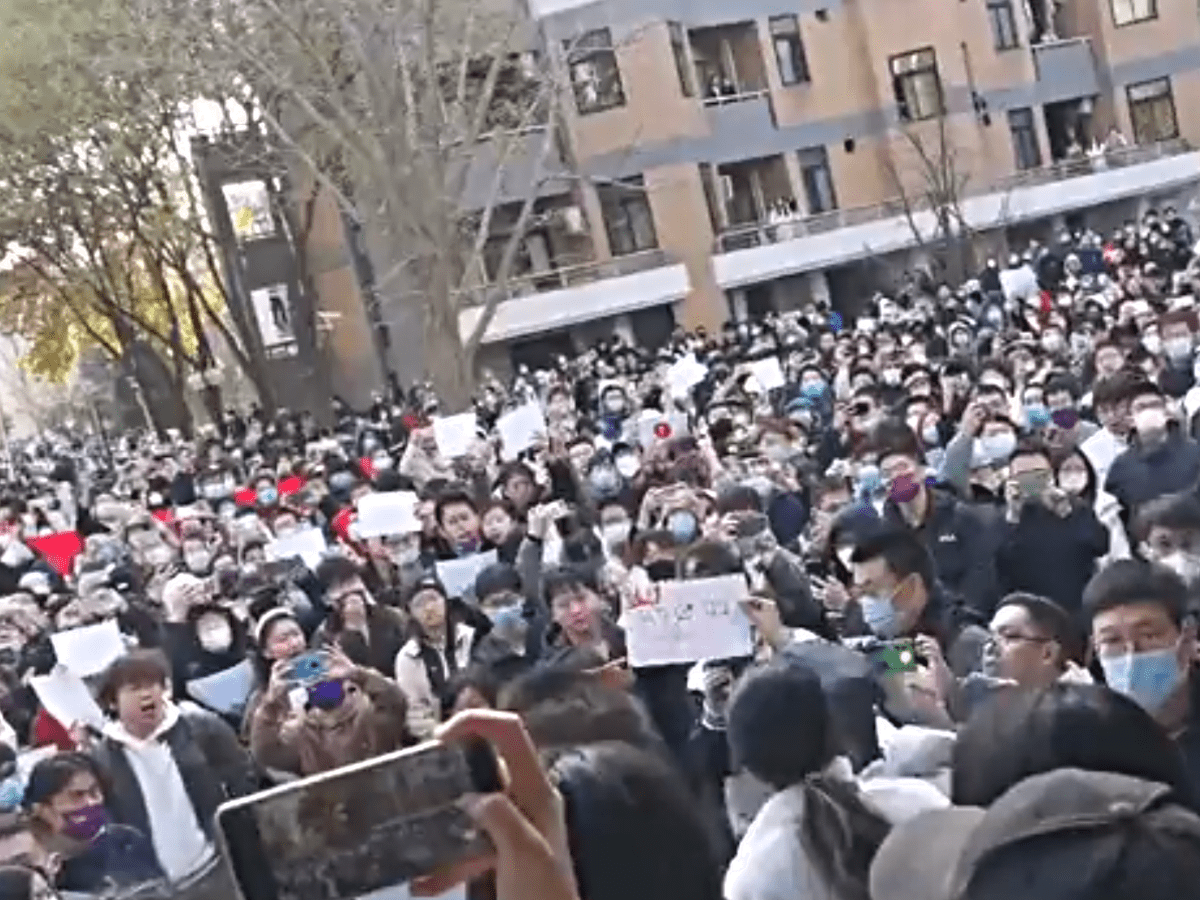
Beijing: In defiance of China’s zero-Covid policy, hundreds of students on Sunday protested at President Xi Jinping’s alma mater, Tsinghua University here.
“Protests have spread to Xi Jinping’s alma mater Tsinghua, where a student said: If we don’t speak up due to the fear of the [dark regime], I think our people will be disappointed. As a Tsinghua student, I’d regret this for the rest of my life. The crowd called out don’t be scared!” tweeted Linda Lew, a Bloomberg reporter.
Thousands of protesters took to the streets of Shanghai, where people were being bundled into police cars. Students have also demonstrated at universities in Beijing and Nanjing.
Hundreds of students from Beijing’s Tsinghua University rallied at their campus on Sunday.
“Tsinghua university right now the city after city seeing protests small and large against Zero Covid policies and against excesses of Communist Party rule – every hour there seems to be a new one,” tweeted Emily Feng, she posted a clip from Weibo, a China microblogging website.
Meanwhile, hundreds of people gathered in downtown Shanghai on Sunday afternoon to hold what appeared to be a silent protest near where a demonstration against China’s zero-Covid policy erupted in the early hours.
Demonstrators holding blank pieces of paper and white flowers stood silently at several intersections, the person said under condition of anonymity, before police officers eventually moved to clear the blocked roads.
Protests in China against heavy COVID-19 curbs spread to Shanghai on Sunday, with demonstrators also gathering at one of Beijing’s most prestigious universities after a deadly fire in the country’s far west sparked widespread anger, reported Reuters.
The latest unrest follows a protest in the remote north-west city of Urumqi, where lockdown rules were blamed after 10 people died in a tower block fire.
China is battling a surge in infections that has prompted lockdowns and other restrictions in cities across the country as Beijing adheres to a zero-Covid-19 policy even as much of the world tries to coexist with the coronavirus.
A fire on Thursday that killed 10 people in a high-rise building in Urumqi, capital of the Xinjiang region, has sparked widespread public anger. Many Internet users surmised that residents could not escape in time because the building was partially locked down, which city officials denied.
In Shanghai, China’s most populous city and financial hub, residents gathered on Saturday night at the city’s Wulumuqi Road – which borrows its name from Urumqi – for a vigil that turned into a protest in the early hours of Sunday.
“Lift lockdown for Urumqi, lift lockdown for Xinjiang, lift lockdown for all of China!” the crowds in Shanghai shouted, according to a video circulated on social media.
At one point a large group began shouting, “Down with the Chinese Communist Party, down with Xi Jinping, free Urumqi!”, according to witnesses and videos, in a rare public protest against the Chinese leadership.
China defends President Xi Jinping’s signature zero-Covid-19 policy as life-saving and necessary to prevent overwhelming the healthcare system.
Officials have vowed to continue with it despite the growing public pushback and its mounting toll on the world’s second-biggest economy.
Videos from Shanghai widely shared on Chinese social media showed crowds facing dozens of police and calling out chants including: “Serve the people”, “We don’t want health codes” and “We want freedom,” reported The Straits Times.
Some social media users posted screenshots of street signs for Wulumuqi Road, both to evade censors and show support for protesters in Shanghai. Others shared comments or posts calling for all of “you brave young people” to be careful.
Many included advice on what to do if police came or started arresting people during a protest or vigil.
Shanghai’s 25 million people were put under lockdown for two months earlier this year, an ordeal that provoked anger and protest.
Chinese authorities have since then sought to be more targeted in their Covid-19 curbs.
But that effort has been challenged by a surge in infections as China faces its first winter with the highly transmissible Omicron variant.
